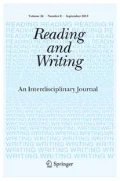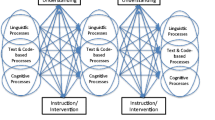Abstract
Teachers’ knowledge of reading comprehension processes is underresearched relative to teachers’ knowledge of word identification and phonological awareness. In this study, sixty-two pre- and inservice upper-elementary and middle school English language arts, science, and social studies teachers completed in-depth interview protocols eliciting multiple aspects of knowledge about reading comprehension processes. Using qualitative analyses, we found that teachers in the sample demonstrated knowledge in four consistent areas: strategizing, grappling to achieve coherence, leveraging and producing knowledge, and participating socially. We propose these concepts as a starting point for characterizing teachers’ knowledge of how comprehension processes work when they are well developed. We discuss implications of these findings for future research and practice in literacy teacher education.

Similar content being viewed by others
Change history
10 May 2022
A Correction to this paper has been published: https://doi.org/10.1007/s11145-022-10306-1
References
Baker, S., Lesaux, N., Jayanthi, M., Dimino, J., Proctor, C. P., Morris, J., Gersten, R., Haymond, K., Kieffer, M. J., Linan-Thompson, S., & Newman-Gonchar, R. (2014). Teaching academic content and literacy to English learners in elementary and middle school (NCEE 2014–4012). Washington, DC: National Center for Education Evaluation and Regional Assistance (NCEE), Institute of Education Sciences, U.S. Department of Education.
Barber, D. (2014). Mrs. Darwin has visitors. Flash Fiction Online. http://flashfictiononline.com/main/article/mrs-darwin-has-visitors/
Barton, D., Hamilton, M., & Ivanic, R. (Eds.). (2000). Situated literacies: Reading and writing in context. Routledge.
Binks-Cantrell, E., Joshi, R. M., & Washburn, E. K. (2012). Validation of an instrument for assessing teacher knowledge of basic language constructs of literacy. Annals of Dyslexia, 62(3), 153–171. https://doi.org/10.1007/s11881-012-0070-8
Boldt, G., & Leander, K. M. (2020). Affect theory in reading research: Imagining the radical difference. Reading Psychology, 41(6), 515–532.
Borko, H., Jacobs, J., & Koellner, K. (2010). Contemporary approaches to teacher professional development. International Encyclopedia of Education, 7(2), 548–556.
Bos, C., Mather, N., Dickson, S., Podhajski, B., & Chard, D. (2001). Perceptions and knowledge of preservice and inservice educators about early reading instruction. Annals of Dyslexia, 51(1), 97–120. https://doi.org/10.1007/s11881-001-0007-0
Carlisle, J. F., Kelcey, B., Rowan, B., & Phelps, G. (2011). Teachers’ knowledge about early reading: Effects on students’ gains in reading achievement. Journal of Research on Educational Effectiveness, 4(4), 289–321. https://doi.org/10.1080/19345747.2010.539297
Castles, A., Rastle, K., & Nation, K. (2018). Ending the reading wars: Reading acquisition from novice to expert. Psychological Science in the Public Interest, 19(1), 5–51.
Cervetti, G. N., & Hiebert, E. H. (2019). Knowledge at the center of English language arts instruction. The Reading Teacher, 72(4), 499–507.
Cho, B., & Afflerbach, P. (2017). An evolving perspective of constructively responsive reading comprehension strategies in multilayered digital text environments. In S. E. Israel (Ed.), Handbook of research on reading comprehension (2nd ed., pp. 109–134). Guilford.
Cho, B., Woodward, L., & Afflerbach, P. (2020). Qualitative approaches to the verbal protocol analysis of strategic processing. In D. L. Dinsmore, L. K. Fryer, & M. M. Parkinson (Eds.), Handbook of strategies and strategic processing (pp. 373–392). Routledge.
Collins, A., & Greeno, J. G. (2010). Situative view of learning. In V. G. Aukrust (Ed.), Learning and cognition in education (pp. 64–68). Elsevier.
Davis, D. S. (2011). Internalization and participation as metaphors of strategic reading development. Theory into Practice, 50(2), 100–106.
Davis, D. S. (2013). Multiple comprehension strategies instruction in the intermediate grades: Three remarks about content and pedagogy in the intervention literature. Review of Education, 1(2), 194–224.
Davis, D. S., Huang, B., & Yi, T. (2017). Making sense of science texts: A mixed-methods examination of predictors and processes of multiple-text comprehension. Reading Research Quarterly, 52(2), 227–252.
Davis, D. S., Jones, J. S., & Samuelson, C. (2021). Is it time for a hard conversation about cueing systems and word reading in teacher education? Reading and Writing Quarterly, 37(4), 301–316. https://doi.org/10.1080/10573569.2020.1792813
Davis, D. S., McElhone, D., & Tenore, F. B. (2015). A dialogic account of reader-text interactions. English Teaching: Practice & Critique, 14(3), 335–349. https://doi.org/10.1108/ETPC-04-2015-0026
Davis, D. S., Samuelson, C., Grifenhagen, J., DeIaco, R., & Relyea, J. (2021b). Getting KnERDI with language: Examining teachers’ knowledge for enhancing reading development in code-based and meaning-based domains. Reading Research Quarterly. https://doi.org/10.1002/rrq.445
Duke, N. K., Pearson, P. D., Strachan, S. L., & Billman, A. K. (2011). Essential elements of fostering and teaching reading comprehension. In S. J. Samuels & A. E. Farstrup (Eds.), What research has to say about reading instruction (4th ed., pp. 51–93). International Reading Association.
Duke, N. K., Ward, A. E., & Pearson, P. D. (2021). The science of reading comprehension instruction. The Reading Teacher, 74(6), 663–672. https://doi.org/10.1002/trtr.1993
Elleman, A. M., Olinghouse, N. G., Gilbert, J. K., Compton, D. L., & Spencer, J. L. (2017). Developing content knowledge in struggling readers. The Elementary School Journal, 118(2), 232–256.
Folsom, J.S., Smith, K.G., Burk, K., & Oakley, N. (2017) Educator outcomes associated with implementation of Mississippi's K-3 Early Literacy Professional Development Initiative. REL 2017–270. Regional Educational Laboratory Southeast.
Gavelek, J. R., & Whittingham, C. E. (2017). Meaning making in the 21st century: The sociogenesis of reading comprehension. In S. E. Israel (Ed.), Handbook of research on reading comprehension (2nd ed., pp. 166–190). Guilford.
Gee, J. P. (2007). What video games have to teach us about learning and literacy: Revised and updated edition. Palgrave Macmillan.
Gutiérrez, K. D., & Rogoff, B. (2003). Cultural ways of learning: Individual traits or repertoires of practice. Educational Researcher, 32(5), 19–25.
Hall, L. A., Johnson, A. S., Juzwik, M. M., Wortham, S. E., & Mosley, M. (2010). Teacher identity in the context of literacy teaching: Three explorations of classroom positioning and interaction in secondary schools. Teaching and Teacher Education, 26(2), 234–243. https://doi.org/10.1016/j.tate.2009.04.009
Hammerness, K., Darling-Hammond, L., Bransford, J., Berliner, D., Cochran-Smith, M., McDonald, M., & Zeichner, K. (2005). How teachers learn and develop. In L. Darling-Hammond & J. Bransford (Eds.), Preparing teachers for a changing world: What teachers should learn and be able to do (pp. 358–389). Jossey-Bass.
Israel, S. E. (2017). Sophistication of reading comprehension: Where to from here? In S. E. Israel (Ed.), Handbook of research on reading comprehension (2nd ed., pp. 649–657). Guilford.
Jiménez, R. T., García, G. E., & Pearson, P. D. (1995). Three children, two languages, and strategic reading: Case studies in bilingual/monolingual reading. American Educational Research Journal, 32(1), 67–97. https://doi.org/10.3102/00028312032001067
Jordan, R. L. P., & Bratch-Hines, M. (2020). Associations of reading knowledge with Kindergarten and first-grade teachers’ reported instructional strategies. Literacy Research and Instruction, 59(4), 277–297.
Kamil, M. L., Borman, G. D., Dole, J., Kral, C. C., Salinger, T., and Torgesen, J. (2008). Improving adolescent literacy: Effective classroom and intervention practices: A Practice Guide (NCEE #2008–4027). Washington, DC: National Center for Education Evaluation and Regional Assistance, Institute of Education Sciences, U.S. Department of Education. Retrieved from http://ies.ed.gov/ncee/wwc.
Kelly, P. (2006). What is teacher learning? A sociocultural perspective. Oxford Review of Education, 32(4), 505–519.
Kintsch, W. (2004). The construction-integration model of text comprehension and its implications for instruction. In R. B. Ruddell & N. J. Unrau (Eds.), Theoretical models and processes of reading (pp. 1270–1328). International Reading Association.
Kucan, L., & Palincsar, A. S. (2013). Comprehension instruction through text-based instruction. International Reading Association.
Kucan, L., Hapgood, S., & Palincsar, A. S. (2011). Teachers’ specialized knowledge for supporting student comprehension in text-based discussions. The Elementary School Journal, 112(1), 61–82. https://doi.org/10.1086/660689
Kucan, L., Palincsar, A. S., Khasnabis, D., & Chang, C. (2009). The video viewing task: A source of information for assessing and addressing teacher understanding of text-based discussion. Teaching and Teacher Education, 25(3), 415–423. https://doi.org/10.1016/j.tate.2008.09.003
Lee, C. D., Goldman, S. R., Levine, S., & Magliano, J. (2016). Epistemic cognition in literary reasoning. In J. A. Greene, W. A. Sandoval, & I. Braten (Eds.), Handbook of epistemic cognition (pp. 165–183). Routledge.
Lincoln, Y. S., & Guba, E. G. (2013). The constructivist credo. Left Coast Press.
McElhone, D. (2012). Tell us more: Reading comprehension, engagement, and conceptual press discourse. Reading Psychology, 33(6), 525–561.
Moats, L. C. (1994). The missing foundation in teacher education: Knowledge of the structure of spoken and written language. Annals of Dyslexia, 44, 81–102. https://doi.org/10.1007/BF02648156
Moats, L. C., & Foorman, B. R. (2003). Measuring teachers’ content knowledge of language and reading. Annals of Dyslexia, 53(1), 23–45. https://doi.org/10.1007/s11881-003-0003-7
Morrell, E. (2015). Critical literacies and urban youth: Pedagogies of access, dissent, and liberation. Routledge.
Oakhill, J., Hartt, J., & Samols, D. (2005). Levels of comprehension monitoring and working memory in good and poor comprehenders. Reading and Writing, 18(7), 657–686.
Pearson, P. D., & Cervetti, G. N. (2015). Fifty years of reading comprehension theory and practice. In P. D. Pearson & E. H. Hiebert (Eds.), Research based practices for teaching Common Core literacy (pp. 1–24). Teachers College Press.
Phelps, G. (2009). Just knowing how to read isn’t enough! Assessing knowledge for teaching reading. Educational Assessment, Evaluation and Accountability, 21(2), 137–154. https://doi.org/10.1007/s11092-009-9070-6
Piasta, S. B., Connor, C. M., Fishman, B. J., & Morrison, F. J. (2009). Teachers’ knowledge of literacy concepts, classroom practices, and student reading growth. Scientific Studies of Reading, 13, 224–248. https://doi.org/10.1080/10888430902851364
Piasta, S. B., Soto Ramirez, P., Farley, K. S., Justice, L. M., & Park, S. (2020). Exploring the nature of associations between educators’ knowledge and their emergent literacy classroom practices. Reading & Writing, 33(6), 1399–1422. https://doi.org/10.1007/s11145-019-10013-4
Pittman, R. T., Zhang, S., Binks-Cantrell, E., Hudson, A., & Joshi, R. M. (2020). Teachers’ knowledge about language constructs related to literacy skills and student achievement in low socio-economic status schools. Dyslexia, 26(2), 200–219.
RAND Reading Study Group. (2002). Reading for understanding: Toward an R&D program in reading comprehension. RAND.
Saldaña, J. (2015). The coding manual for qualitative researchers (3rd ed.). Sage.
Spear-Swerling, L., & Cheesman, E. (2012). Teachers’ knowledge base for implementing response-to-intervention models in reading. Reading and Writing, 25(7), 1691–1723. https://doi.org/10.1007/s11145-011-9338-3
Spear-Swerling, L., & Zibulsky, J. (2014). Making time for literacy: Teacher knowledge and time allocation in instructional planning. Reading and Writing, 27(8), 1353–1378. https://doi.org/10.1007/s11145-013-9491-y
Strauss, A., & Corbin, J. (1998). Basics of qualitative research: Techniques and procedures for developing grounded theory (2nd ed.). Sage Publications Inc.
Street, B. V. (1984). Literacy in theory and practice. Cambridge University Press.
U.S. Department of Education, National Center for Education Statistics. (2019). Digest of Education Statistics, 2018 (NCES 2020–009), Chapter 2.https://nces.ed.gov/fastfacts/display.asp?id=28
Uccelli, P., & Galloway, E. P. (2016). Academic language across content areas: Lessons from an innovative assessment and from students’ reflections about language. Journal of Adolescent & Adult Literacy, 60(4), 395–404.
Verloop, N., Van Driel, J., & Meijer, P. (2001). Teacher knowledge and the knowledge base of teaching. International Journal of Educational Research, 35(5), 441–461. https://doi.org/10.1016/s0883-0355(02)00003-4
Wyatt, D., Pressley, M., El-Dinary, P. B., Stein, S., Evans, P., & Brown, R. (1993). Comprehension strategies, worth and credibility monitoring, and evaluations: Cold and hot cognition when experts read professional articles that are important to them. Learning and Individual Differences, 5(1), 49–72. https://doi.org/10.1016/1041-6080(93)90026-O
Acknowledgements
This research was supported by a grant from the Spencer Foundation, #201400125
Author information
Authors and Affiliations
Corresponding author
Ethics declarations
Conflict of interest
We have no conflicts of interest to disclose.
Additional information
Publisher's Note
Springer Nature remains neutral with regard to jurisdictional claims in published maps and institutional affiliations.
The original online version of this article was revised: In the original publication of the article, Abstract section was not included.
Rights and permissions
About this article
Cite this article
Davis, D.S., Tenore, F.B., McElhone, D. et al. What do upper-elementary and middle school teachers know about the processes of text comprehension?. Read Writ 35, 2257–2283 (2022). https://doi.org/10.1007/s11145-022-10268-4
Accepted:
Published:
Issue Date:
DOI: https://doi.org/10.1007/s11145-022-10268-4




